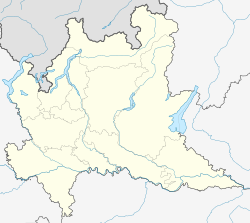Mandello del Lario
Mandello del Lario | |
|---|---|
| Comune di Mandello del Lario, Città di Mandello del Lario | |
 | |
| Coordinates: 45°55′N 09°19′E / 45.917°N 9.317°E | |
| Country | Italy |
| Region | Lombardy |
| Province | Lecco (LC) |
| Frazioni | Olcio, Maggiana, Mandello a lago, Tonzanico, Molina, Mulini, Motteno, Cologna, Luzzeno, Moregallo, Rongio, Gorlo, Somana, Sonvico |
| Government | |
| • Mayor | Riccardo Fasoli |
| Area | |
• Total | 43.33 km2 (16.73 sq mi) |
| Elevation | 200 m (700 ft) |
| Population (30 September 2017)[2] | |
• Total | 10,340 |
| • Density | 240/km2 (620/sq mi) |
| Demonym | Mandellesi |
| Time zone | UTC+1 (CET) |
| • Summer (DST) | UTC+2 (CEST) |
| Postal code | 23826 |
| Dialing code | 0341 |
| Patron saint | Saint Lawrence |
| Website | Official website |
Mandello del Lario (Lecchese: Mandèll) is an Italian town and comune in the province of Lecco, in Lombardy, on Lake Como.
Since 1921, Mandello del Lario has been home to Moto Guzzi—the Italian motorcycle manufacturer, now a subsidiary of Piaggio & Co. SpA. The town each year since 2001 has hosted GMG (a.k.a. Giornata Mondiale Guzzi or Worldwide Guzzi Days).
The Grigna massif is located in Mandello's communal territory.[3]
Saint George's church
[edit]Saint George's church has a single hall with a visible truss ceiling and a quadrangular apse with a cross-vaulted ceiling. Its present aspect is due to restoration work which began in the 14th century, to a building which had already existed since the 11th century.[4]
A holy-water font decorated with a geometrical twisting floral motif (very popular in the Como area between the 6th and 11th century) on the font and with a relief (not very prominent) showing a cross on the sides, is preserved from the original building.
In the nave are numerous votive frescoes dating back to the 15th century; the Crucifixion in the presbytery is from the end of the 15th century; the eschatological cycle, according to some researchers, is related to the Ligurian-Piedmontese painting tradition, whilst according to others it is closer to the local tradition, and is placed around 1480.[5]
See also
[edit]References
[edit]- ^ "Superficie di Comuni Province e Regioni italiane al 9 ottobre 2011". Italian National Institute of Statistics. Retrieved 16 March 2019.
- ^ "Popolazione Residente al 1° Gennaio 2018". Italian National Institute of Statistics. Retrieved 16 March 2019.
- ^ Annalisa Borghese, Mandello Lario, in Il territorio lariano e i suoi comuni, Milano, Editoriale del Drago, 1992, pp. 284-286.
- ^ Chiesa di San Giorgio, Via del Viandante, Mandello del Lario
- ^ Chiesa di S. Giorgio
External links
[edit]




